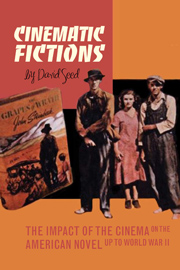Book contents
- Frontmatter
- Contents
- Introduction
- 1 Beginnings
- 2 Modernist Experiments: Gertrude Stein and Others
- 3 H.D. and the Limits of Vision
- 4 Ernest Hemingway: The Observer's Visual Field
- 5 Success and Stardom in F. Scott Fitzgerald
- 6 William Faulkner: Perspective Experiments
- 7 John Dos Passos and the Art of Montage
- 8 Dreiser, Eisenstein and Upton Sinclair
- 9 Documentary of the 1930s
- 10 John Steinbeck: Extensions of Documentary
- 11 Taking Possession of the Images: African American Writers and the Cinema
- 12 Into the Night Life: Henry Miller and Anaïs Nin
- 13 Nathanael West and the Hollywood Novel
- Bibliography
- Index
8 - Dreiser, Eisenstein and Upton Sinclair
- Frontmatter
- Contents
- Introduction
- 1 Beginnings
- 2 Modernist Experiments: Gertrude Stein and Others
- 3 H.D. and the Limits of Vision
- 4 Ernest Hemingway: The Observer's Visual Field
- 5 Success and Stardom in F. Scott Fitzgerald
- 6 William Faulkner: Perspective Experiments
- 7 John Dos Passos and the Art of Montage
- 8 Dreiser, Eisenstein and Upton Sinclair
- 9 Documentary of the 1930s
- 10 John Steinbeck: Extensions of Documentary
- 11 Taking Possession of the Images: African American Writers and the Cinema
- 12 Into the Night Life: Henry Miller and Anaïs Nin
- 13 Nathanael West and the Hollywood Novel
- Bibliography
- Index
Summary
Dreiser on Film
In addition to sharing Dos Passos' conviction that film should inform representations of society in his novels, Theodore Dreiser's interest in the cinema had a long history, as has been partly acknowledged by three critics. In 1928 Dreiser published an article about Mack Sennett in which he records that he had been an enthusiastic viewer of his films since 1910. In 1938 Dreiser wrote to Sergei Eisenstein, whom he had met in Moscow ten years earlier, declaring: ‘ever since the inception of the moving picture technique, I have looked on it as an artistic medium far surpassing for most expressive purposes, writing, painting and the other arts, and I have hoped that my own work could be satisfactorily translated into it’.
The first signs of this interest begin to show themselves in Dreiser's writings of the 1910s, although it is important to recognize that even earlier, around the turn of the century, he had expressed a related fascination with photography, writing articles on Alfred Stieglitz and the Camera Club of New York. In a letter of 1914 to H. L. Mencken (by then a close friend), he discussed the scene divisions in ‘The Born Thief’, a script he had submitted to Pathé for consideration, and the following year he told Mencken that he had been approached about becoming scenario director for Mirror Films, ‘a new and somewhat imposing film corporation’.
- Type
- Chapter
- Information
- Cinematic FictionsThe Impact of the Cinema on the American Novel up to World War II, pp. 151 - 172Publisher: Liverpool University PressPrint publication year: 2009



